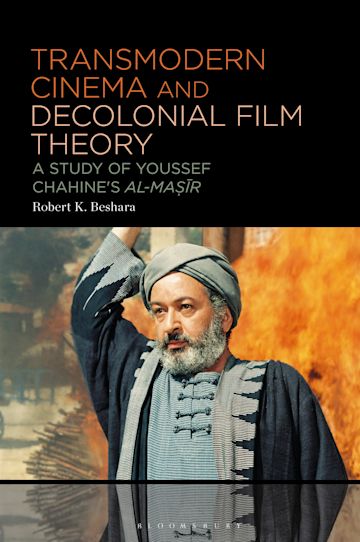You must sign in to add this item to your wishlist. Please sign in or create an account
In this book, Robert K. Beshara applies decolonial film theory to an analysis of Youssef Chahine's (1997) Al-Masir (Destiny).
Transmodern Cinema and Decolonial Film Theory is the first book on decolonial film theory, which unpacks key concepts in decoloniality and decolonial aesthetics. Decolonial film theory is then applied to Youssef Chahine's (1997) historical drama al-Ma?ir in an effort to juxtapose the Egyptian filmmaker (Chahine) and his decolonial cinema to the Andalusian polymath (Ibn Rushd) and his Islamic philosophy.
| Published | Apr 04 2024 |
|---|---|
| Format | Ebook (PDF) |
| Edition | 1st |
| Extent | 192 |
| ISBN | 9781501385094 |
| Imprint | Bloomsbury Academic |
| Publisher | Bloomsbury Publishing |
Robert K. Beshara's compelling endeavor to “sketch the contours” of decolonial film theory is both captivating and profound. Through skillfully unpacking key concepts of postcolonial theory, modernity, coloniality, and decoloniality, his film theory is positioned as a radical aesthetic project navigating the delicate balance between the negation of oppression and the affirmation of liberation. Beshara enacts this through the thought-provoking selection of Egyptian cinematic icon Youssef Chahine and his 1997 film, al-Masir, portraying philosopher Ibn Rushd. The resulting book impressively renders a constellation of transhistorical and transmodern historiographies, ideas, and creative methodologies, offering an invaluable perspective for contemporary practices of critical scholars, artists, and activists.
Fareed Armaly, Artist and Curator, US
Seldom have I seen decolonial theory applied across disciplines with such lucidity. Robert K. Beshara brings personal passion and intellectual commitment not only to a film, its maker and its subject - two of the Arab world's more compelling figures, respectively the 20th-century filmmaker Youssef Chahine and the 12th-century philosopher Ibn Rushd - but also to a worldwide vision and political program. Outside the labyrinths of politics, with erudition and alacrity, he manages to undertake genuinely revolutionary work. Suddenly the veil of Orientalist hierarchy and Eurocentric hegemony is torn to reveal an infinitely more engaging world.
Youssef Rakha, Novelist and Essayist, Egypt
In this fascinating text, Beshara deftly analyses one of Youssef Chahine's most ambitious films through the prism of third-world internationalism, simultaneously problematizing 'world cinema' as we know it while making an intervention in decolonial studies. The book is an excellent primer for those unfamiliar with Chahine's work. It provides an extra layer of refreshing analytical critique for those presenting an in-depth engagement with artistic work sorely missing from the current art criticism landscape.
Nihal El Aasar, Researcher, UK
Free US delivery on orders $35 or over
Your School account is not valid for the United States site. You have been logged out of your account.
You are on the United States site. Would you like to go to the United Kingdom site?
Error message.

